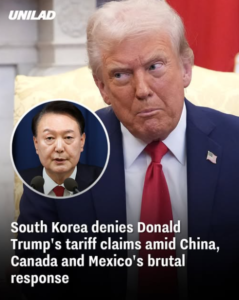In the face of escalating trade tensions initiated by U.S. President Donald Trump’s recent tariff announcements, South Korea has actively refuted claims suggesting its average tariff rates surpass those of the United States. Acting President Choi Sang-mok has called for a comprehensive assessment of the new U.S. tariffs imposed on key trading partners—Canada, Mexico, and China—and is advocating for supportive measures to assist South Korean enterprises operating within these nations.
President Trump has justified these tariffs, which include a 25% levy on imports from Canada and Mexico and a 20% tariff on Chinese goods, by citing trade imbalances and the use of tariffs by other countries against the U.S. In his address to Congress, Trump highlighted that South Korea’s average tariff levels are higher than those of the U.S., a claim that South Korea disputes, pointing to an import tariff rate of approximately 0.79% under their free trade agreement with the U.S.
The international community, including nations like Canada, Mexico, and China, has voiced strong opposition to these tariffs. Mexican President Claudia Sheinbaum warned that such measures could lead to a series of retaliatory actions, jeopardizing mutual business interests. She emphasized that neither threats nor tariffs would effectively address issues related to migration or drug consumption.
China has also expressed its readiness to confront any form of aggression, including trade conflicts. The Chinese government criticized the U.S. for violating World Trade Organization rules and has imposed retaliatory tariffs on American agricultural products. China’s Foreign Ministry underscored its preparedness for any type of war, highlighting the potential global economic repercussions of such trade disputes.
In response to these developments, South Korea is proactively preparing a $34 billion policy fund aimed at bolstering domestic companies in strategic technology sectors such as semiconductors, automotive, biopharmaceuticals, aerospace, and artificial intelligence. This initiative seeks to enhance economic security and maintain competitiveness amid global supply chain disruptions and protectionist measures.
The imposition of these tariffs has far-reaching implications, potentially leading to higher costs for businesses reliant on international imports, which may be passed on to consumers. Economists warn that the U.S. GDP could experience a reduction of approximately 0.4%, equating to a loss of over $100 billion. The situation underscores the volatility and uncertainty injected into the global economy, affecting both producers and consumers worldwide.
In summary, the recent tariff actions have ignited a complex web of international disputes, with nations like South Korea, Canada, Mexico, and China actively challenging the U.S.’s stance. The outcomes of these trade conflicts remain uncertain, but they undoubtedly contribute to a climate of economic instability and heightened geopolitical tensions.


